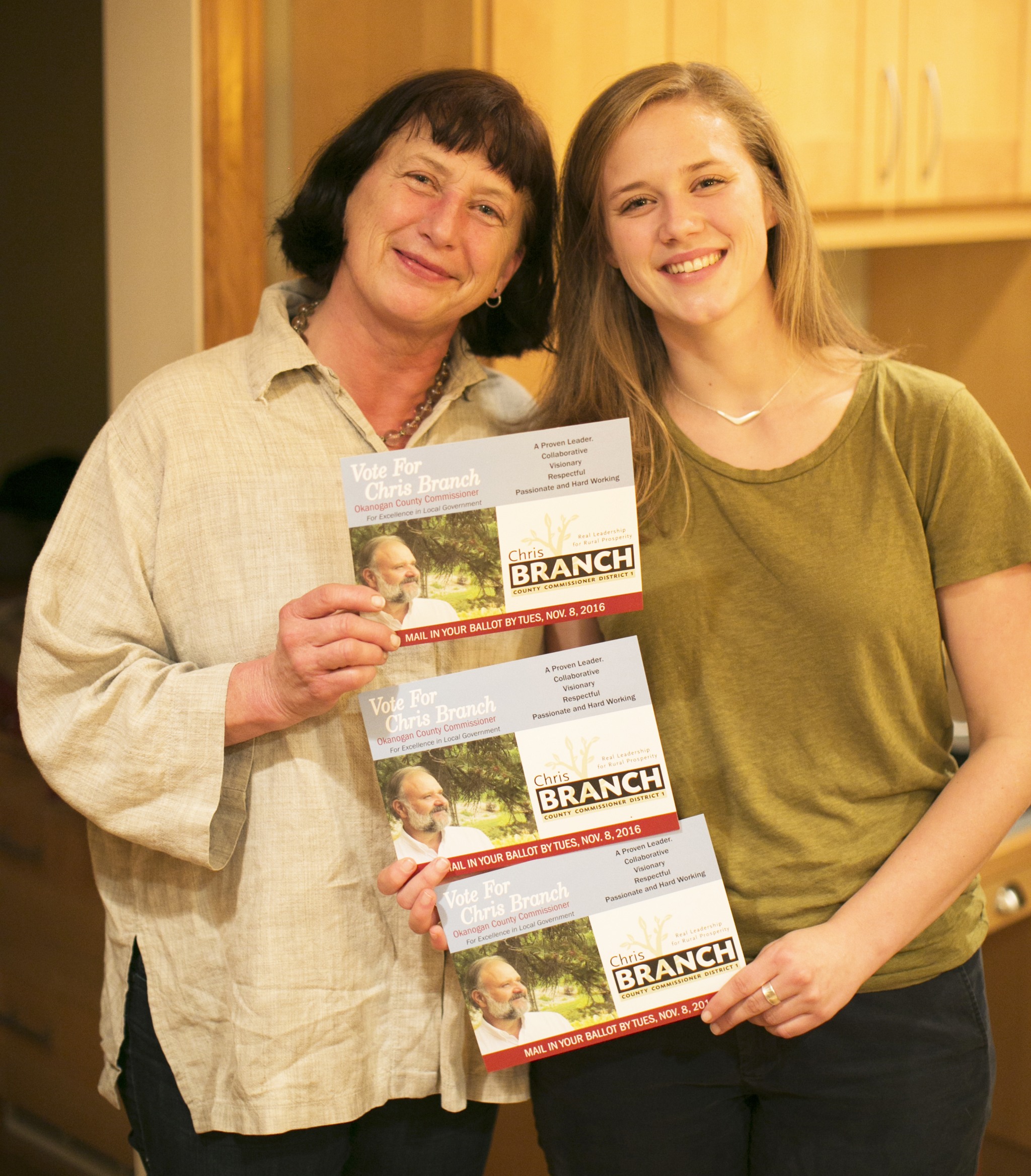Donald Trump may have won the presidency, and islander Nancy Soriano is not happy about that election, but she’s overjoyed that Chris Branch won his campaign for county commissioner in rural Okanogan County in Eastern Washington.
Soriano and her husband, Jim, and daughter, Trudy, own a ranch and live part-time in the county. They spent many months campaigning to put Branch in office after living with a long history of county commissioners who, according to Nancy, were disrupting any attempts to oppose the county’s constant efforts to turn over the county’s public lands to private owners.
Providing a glimpse of what the Sorianos encountered in Okanogan, Democrats Governor Jay Inslee, U.S. Senator Patty Murray and State Commissioner of Public Lands candidate Hilary Franz were all defeated there, despite the fact that they won statewide.
And just who is Branch? One answer comes from Okanogan resident James M. Miller, who, in the Okanogan Valley Gazette-Tribune issue of Aug. 15, said that Branch, to date, had raised campaign funds totaling $12,276 with $9,519.22 coming from out of the county, “mostly from Puget Sound and Eugene, Oregon.”
“Eugene is the PNW’s hotbed of ‘greenies,’ a.k.a. anti-capitalist U.N. zombies. These folks,” he said, “think technology ends with solar-powered electric bongs.”
Of course, he was lumping together Eugene and Puget Sound and, said Nancy, the local paper regularly portrays her kind as “Green Slime” and even worse maybe, “Westsiders.”
The county commissioners have been against environmental protection practically forever and, according to Nancy, they turned down $12 million of state money in the past few years designated for conservation easements.
But Branch, despite the opposition’s negative publicity, and running as an Independent in a deeply Republican county, won handily by over 600 votes, said Nancy, but only after he squeaked by in the primary by one vote.
He did so with a very convincing resume. He’s lived in Okanogan County for 40 years, his mother’s side of the family is Colville Indian, and he has a degree in environmental studies from Evergreen State College. In his younger days, he had jobs in the timber industry, on ranches and farms. He is also the community development director for the city of Oroville in Okanogan County.
That’s the situation the Sorianos found when they embarked on their campaign to elect Branch a little more than a year ago, and Miller certainly wasn’t off the mark: The Sorianos were — and are — dedicated to protecting Okanogan agriculture, water resources and habitat from private exploitation. That’s in part because they have owned land in the Okanogan (their land is 30 miles outside of Omak, very remote) for 30 years, and all of the family, including son, Alex, are registered voters there. And they are, needless to say, actual environmentalists.
But of course the Sorianos didn’t pull off the win all by themselves, although they did contribute money to Branch’s campaign. They are part of ROC or “Represent Okanogan County,” a group of like-minded Okanogans who banded together a year and a half ago to encourage people to run against the incumbent county commissioners. Branch was their first success, and ROC is developing plans for its future mission.
To publicize the group’s effort, ROC created a website to inform Okanogans of ROC’s goal to elect new commissioners, and, on top of that, ROC members went regularly to commissioners’ meetings to take notes since the commissioners had a habit of not making meeting notes easily available or accurate. ROC made sure that the public could know, via the website, what was actually happening at the meetings.
As Nancy put it, “My personal incentive for getting involved in the commissioners’ business was that they were adopting bad land use policies.”
With that, Nancy and Trudy got out into the countryside and canvassed Okanogan voters, urging them to elect Branch.
Before she and Trudy started canvassing, Nancy said, “Frankly, I was hesitant to canvass in Okanogan County for a candidate like Chris.” She was fearful she’d encounter only people who bought into the commissioners’ stereotype of ROC members, but the mother-daughter duo had a surprise.
“We canvassed hundreds of homes throughout the county,” Nancy said, “from Oroville to Omak to Pateros to Coulee Dam and the Coleville Reservation. We were pretty scared, but at the end of a day we would both comment at how everyone was so nice. This experience has given me hope and joy beyond my wildest expectations. We never experienced one hostile person.”
Okanogan County is large, with a population of only 45,000, about four times the population of Vashon. And it has a diversity of cultures and communities: Latino, Native and Caucasian, many of them living in serious poverty.
“I met people who spoke no English,” Nancy said, “and others who said ‘We are Catholic,’ assuming that we were Jehovah’s Witnesses. We found signs on doors that said the same thing.”
But with all that, Nancy and Trudy found that their encounters were actually friendly.
Their experience in Okanogan made them feel calmer and gave them greater faith in a majority of people who seemed to them decent and kind and generous.
“I was totally out of my comfort zone,” said Nancy, “to knock on strangers’ doors. Turns out it gave me great joy. The Trump election tells us we need to be more engaged in community. Elections create a space for meaningful interaction with other citizens.”
And, she added, “voting is not enough, any more … engaging in the process, especially on the local level, within community, can help people pull back the curtain on the message of hate and divisiveness. Takes the strange out of stranger.”


